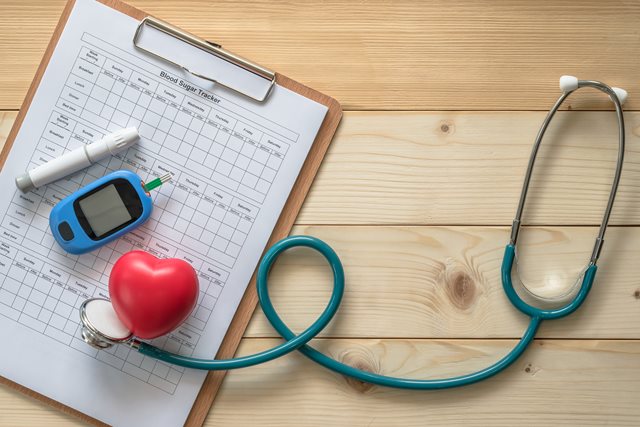When an emergency room physician told Susan Glendinning she had type 2 diabetes, she started to cry. She didn’t know much about the condition, but she understood this was a life-changing diagnosis.
For several months before her diagnosis, Susan had been experiencing some of the classic symptoms of diabetes—extreme thirst, frequent urination, tiredness and unexplained weight loss. But she felt she was too busy to follow up on her family doctor’s recommendation that she have her blood sugar (glucose) tested at a lab, and instead asked a friend who has type 2 diabetes to test Susan using her personal blood glucose monitor. Susan remembers, “She was standing behind me, and I heard her gasp and say to her husband, ‘She’s 33.’ I asked, ‘Is that high?’ ” (Blood sugar is considered to be high at 11 mmol/L or above.)
At the urging of her daughter who is a nurse, Susan went to her local emergency department in Prince George, B.C., where she received the diagnosis of type 2 diabetes, and then to her family doctor, who started her on the oral diabetes drug metformin to regulate her blood sugar.
A new diagnosis
Still, something did not seem right to Susan. Relatively young (46 at the time; she is now 52), slim, fit and with no family history of diabetes, she seemed to be at low risk for type 2 diabetes. When she questioned the diagnosis, her doctor told her she was too old to be diagnosed with type 1 diabetes (which is usually diagnosed in people under age 25), so it must be type 2.
She was also troubled by stubbornly high blood sugar levels. “It didn’t matter what medication they gave me; nothing was working. My blood sugar just kept getting higher and higher and higher,” she says. “The only way I could keep it from spiking was to cut carbs drastically.”
After three frustrating months, a different family physician shared Susan’s suspicion: Maybe she did not have type 2 diabetes after all. She was referred to a diabetes education centre, where a C-peptide test showed that her body was not producing any insulin, confirming that she had type 1 diabetes.
Although starting insulin and learning how to keep her blood sugar levels within target range was a challenge at first, Susan has been able to manage her diabetes well for five years now.
It was actually a relief to get this diagnosis, to be validated and to know that I would get the right treatment.
She finds having a continuous glucose monitor—which she calls “really amazing technology”—particularly helpful, especially as her husband also receives alerts on his phone if her blood sugar drops too low.
Finding support
“Diabetes is sort of an invisible thing that you’re going through. From the outside, people don’t realize how much of a struggle it can be,” says Susan. Being diagnosed with type 1 diabetes later in life has been isolating for her as she does not know anyone with a similar experience. “There isn’t anybody who can say they know how that feels.”
This is why Susan and her family chose to support D-Camps with a generous donation. Operated by Diabetes Canada, these nine camps across the country give children living with type 1 diabetes the opportunity to connect with and support each other while enjoying a traditional summer camp experience.
“It’s an incredible feeling to know you’ve been able to do some good and influence some positive change to boot!”
Did you know?
You can double your impact for kids with type 1 by giving to Diabetes Canada today. Now until December 31, 2024, donations that Diabetes Canada receives will be matched, dollar for dollar. That means every $1 you give today becomes $2. Donate now in support of this year’s D-Camps match campaign.
Related Content

Newly diagnosed
A diabetes diagnosis can feel intimidating but just know we have the tools and resources you need to succeed.
Learn more About Newly diagnosed
Impact stories
Read stories of inspiration from other people affected by diabetes.
Get started About Impact stories
Tools and resources
Take charge of your health with tools and resources from Diabetes Canada.
Get started About Tools and resources